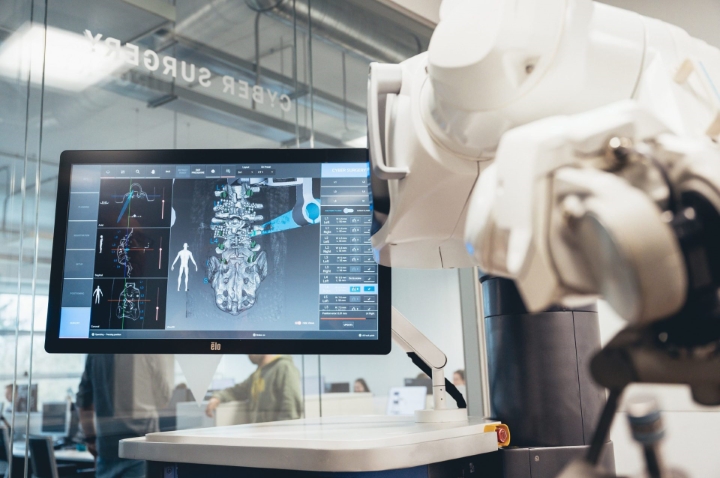Cyber Surgery develops the first Basque surgical robot to reach hospitals

Cyber Surgery successfully completes clinical trials on patients at the Hospital Universitario Donostia, in San Sebastian, and at the Hospital Universitario Cruces, in Bilbao.
The operation is based on the placement of transpedicular screws to treat pathologies such as scoliosis, canal stenosis, degenerative diseases, tumours or vertebral fractures.
With this robot, operations are minimally invasive, speeding up the patient’s recovery, increasing precision in the placement of the screws and reducing the operation time.
 Cyber Surgery, a healthcare technology startup specialising in medical robotics, has successfully completed a clinical trial on patients with its surgical robot for spinal operations. It is the first Spanish robot to reach this important milestone, which is the prelude to its market launch. After receiving certification from the Spanish Agency for Medicines and Health Products (AEMPS) to begin testing its innovative technology on patients, Cyber Surgery is carrying out these trials on patients in two reference hospitals of the Basque Health Service (Osakidetza), Donostia University Hospital in San Sebastian and Cruces University Hospital in Bilbao.
Cyber Surgery, a healthcare technology startup specialising in medical robotics, has successfully completed a clinical trial on patients with its surgical robot for spinal operations. It is the first Spanish robot to reach this important milestone, which is the prelude to its market launch. After receiving certification from the Spanish Agency for Medicines and Health Products (AEMPS) to begin testing its innovative technology on patients, Cyber Surgery is carrying out these trials on patients in two reference hospitals of the Basque Health Service (Osakidetza), Donostia University Hospital in San Sebastian and Cruces University Hospital in Bilbao.
The clinical trials have been aimed at interventions based on the placement of transpedicular screws, which is the most commonly used operation for the treatment of different types of pathologies affecting the spine, such as scoliosis, canal stenosis, degenerative diseases, tumours or vertebral fractures. However, the robot can be used for more spinal procedures, such as surgical planning or bone cutting, being the first steps in Cyber Surgery’s strategy to create a fully robotic operating theatre.
These interventions have been performed and directed by the principal investigators of the trial, Dr. Nicolás Samprón, neurosurgeon at Hospital Universitario Donostia (San Sebastián) and researcher of the IIS Biodonostia group, and Dr. Iñigo Pomposo, head of the neurosurgery service at Hospital Universitario Cruces (Bilbao) and researcher at IIS Biocruces Bizkaia, together with their teams. In addition to these doctors, radiology teams from the Hospital Universitario Donostia, Hospital Universitario de Cruces and Hospital de Universitario Araba are participating in order to verify the post-surgery images and confirm that everything is working correctly.
The objective of this trial is to clinically validate the precision, safety and effectiveness of the robot in guiding the surgeon for screw placement. After extensive validation and testing on human cadavers, the human patient trial began in November 2022. The ultimate goal of these patient trials is to achieve full validation of the robot so that it can be available on the market by 2024.
Minimally invasive for the patient and highly accurate for the doctor
 One of the characteristics that differentiates Cyber Surgery’s robot from others in the sector is that it has patented technology for patient location and tracking, which allows for greater precision, reduced X-ray exposure for both the patient and the surgeon, improved workflow in the operating theatre and shorter surgery times. Therefore, the Cyber Surgery robot stands out for its great benefits both for the patient, as it is minimally invasive surgery and speeds up the recovery process in the hospital, from an estimated 9-10 to 6-7 days, as well as for the doctor, due to its high precision, ease of handling, ergonomics and adaptability.
One of the characteristics that differentiates Cyber Surgery’s robot from others in the sector is that it has patented technology for patient location and tracking, which allows for greater precision, reduced X-ray exposure for both the patient and the surgeon, improved workflow in the operating theatre and shorter surgery times. Therefore, the Cyber Surgery robot stands out for its great benefits both for the patient, as it is minimally invasive surgery and speeds up the recovery process in the hospital, from an estimated 9-10 to 6-7 days, as well as for the doctor, due to its high precision, ease of handling, ergonomics and adaptability.
In the words of Dr. Iñigo Pomposo, head of the neurosurgery service who has led the clinical trials at Cruces University Hospital: “Cyber Surgery’s robot has a system for determining the trajectory that is more precise than others on the market, which results in greater patient safety. These trials are the culmination of a long collaboration and the beginning of other areas such as brain surgery,” he says.
For Dr. Nicolás Samprón, neurosurgeon who has led the clinical trials at the Hospital Universitario Donostia: “One of the main benefits of Cyber Surgery’s robotic assistant is its great capacity to adapt to the surgeons’ needs, its ease of use and its high precision. This allows us to perform spinal operations in a minimally invasive way, with a greater degree of safety and reducing recovery times for our patients,” he says.
This robot is aimed at assisting the doctor in spinal operations by achieving the highest levels of precision, which is achieved thanks to its innovative technology. As Jorge Presa, CEO of Cyber Surgery, explains: “The robots that guide the surgeon do so on the basis of information from the medical image, the planning that the doctor has done in the software and the system that reads the position of the robot in relation to the patient. Currently, this is done using optical technology, but we have developed our own haptic technology, where the system knows the patient’s position at all times in a more precise and user-friendly way than the optical ones. Therefore, we manage to improve patient safety, among other benefits”. In addition, the Cyber Surgery robot, thanks to the built-in artificial intelligence, supports the surgeon during the planning and intervention process, making the surgery even safer and optimising the intervention process.
From R&D project to robot tested on patients
 This is a major step forward in technology applied to medicine that was born from an R&D project led by Egile Corporation XXI, together with the Ceit research centre and the University Clinic of Navarra, in 2013. It was joined by collaborators such as the Vicomtech research centre, the Biodonostia Health Research Institute (IIS Biodonostia) and the Biocruces Bizkaia Health Research Institute (IIS Biocruces), coordinated by BIOEF, the Basque Foundation for Health Innovation and Research, which have always supported Cyber Surgery and have become a fundamental part of bringing this robot to the market. The participation of the Basque Public Health System in this collaboration, from pre-clinical research to patient trials, has been supported by the Medtech initiative, promoted by the Basque Government’s Department of Health, to contribute to the development and validation of health technologies from Basque companies. The clinical trials have also been co-funded through the open call within the European TBMED project (“an open innovation testing bed for the development of high-risk medical devices”) in which BIOEF and the three Health Research Institutes participate and coordinated by the CIDETEC technology centre. The TBMED project has received funding from the European Union’s Horizon 2020 research and innovation programme under grant agreement no. 814439.
This is a major step forward in technology applied to medicine that was born from an R&D project led by Egile Corporation XXI, together with the Ceit research centre and the University Clinic of Navarra, in 2013. It was joined by collaborators such as the Vicomtech research centre, the Biodonostia Health Research Institute (IIS Biodonostia) and the Biocruces Bizkaia Health Research Institute (IIS Biocruces), coordinated by BIOEF, the Basque Foundation for Health Innovation and Research, which have always supported Cyber Surgery and have become a fundamental part of bringing this robot to the market. The participation of the Basque Public Health System in this collaboration, from pre-clinical research to patient trials, has been supported by the Medtech initiative, promoted by the Basque Government’s Department of Health, to contribute to the development and validation of health technologies from Basque companies. The clinical trials have also been co-funded through the open call within the European TBMED project (“an open innovation testing bed for the development of high-risk medical devices”) in which BIOEF and the three Health Research Institutes participate and coordinated by the CIDETEC technology centre. The TBMED project has received funding from the European Union’s Horizon 2020 research and innovation programme under grant agreement no. 814439.
From then until today, Cyber Surgery has evolved a lot since it was incorporated as a company in 2017, when the first cadaver tests were performed. In 2018 it incorporated Basque FCR (Gestión de Capital Riesgo del País Vasco – Spri Group), Geroa EPSV and IMQ (Adeslas group) in its shareholding. It is currently in the process of increasing capital for the international commercial launch.
The team is made up of 26 people, including doctors and engineers in different disciplines such as mechanics, software, robotics, telecommunications and bioengineering. Since its creation, five international patents have been applied for and it enjoys strong support from doctors and international health institutions.




